|
|
|
Sort Order |
|
|
|
Items / Page
|
|
|
|
|
|
|
| Srl | Item |
| 1 |
ID:
131415
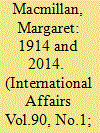

|
|
|
|
|
| Publication |
2014.
|
| Summary/Abstract |
The outbreak of the First World War remains a great historical puzzle and a source of concern, for if we do not understand how it came about we run the risk of stumbling into a similar catastrophe. This article draws parallels between the world of 1914 and the present. It starts with comfortable assumptions made by so many, then and now, that a major conflict was impossible or improbable and then looks at the paradox that globalization not only made the world more interdependent and linked, but also fostered intense local and national identities. It suggests factors that propelled Europe to war in 1914, including national rivalries, imperialism, the arms race and a shifting power balance between rising and declining powers, as well as ideologies and assumptions such as Social Darwinism and militarism, and points out that similar forces and ideas are present today. The article also stresses the dangerous complacency that can arise as a result of decision-makers having successfully dealt with a series of crises. European decision-makers also assumed that they could successfully use war as an instrument of policy and largely ignored or explained away the mounting evidence that the advantage in conflict was swinging to the defence. Again, as the author points out, there are disquieting parallels with the present.
|
|
|
|
|
|
|
|
|
|
|
|
|
|
|
|
| 2 |
ID:
131988
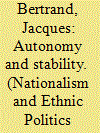

|
|
|
|
|
| Publication |
2014.
|
| Summary/Abstract |
Autonomy is often seen as an institutional instrument to manage substate nationalist conflict. Its implementation is key in determining its impact on conflict. While the central state might be satisfied with the absence of violence and stability as a measure of success, an aggrieved group will view success as gaining new powers and new resources. Autonomy often unravels when different goals are being pursued during implementation. "Special autonomy" in Papua failed because, first, the law was not the product of negotiation but of a solution that the central government imposed; second, Papuans remained divided on its utility and, ultimately, failed to seize the opportunity provided; third, the central government undermined the law in its attempts to curb secessionism, ultimately failing to make it credible.
|
|
|
|
|
|
|
|
|
|
|
|
|
|
|
|
| 3 |
ID:
131909
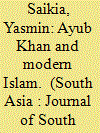

|
|
|
|
|
| Publication |
2014.
|
| Summary/Abstract |
Pakistan is viewed today as a haven for fundamentalist Islamists. This essay probes the genealogy of Pakistan's Islamisation by focusing on the rule of President Ayub Khan (1958-69) and extends to the war of 1971 and the dismembering of Pakistan during Yahya Khan's presidency. I trace Ayub Khan's project of 'modernising Islam and the nation' by probing three sites: the transformation of the Pakistani military into a jihadic army; the re-writing of history to craft an Islamic identity; and the reformation of East Pakistani Bengalis to make them 'good Muslim subjects'. Ayub Khan's experiment was a failure, leading to the violent dismembering of the country in 1971, yet an ethical imaginaire of renewing the commitment to creating a humanistic moral community continues to be an ongoing quest in Pakistan, as reflected in my investigations of the oral testimonies of war veterans. Fulfilling these ethical concerns requires critical evaluation of the roots of Islamisation in Pakistan, beginning from the period of Ayub Khan's presidency.
|
|
|
|
|
|
|
|
|
|
|
|
|
|
|
|
| 4 |
ID:
106282
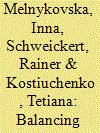

|
|
|
| 5 |
ID:
114954
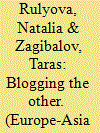

|
|
|
|
|
| Publication |
2012.
|
| Summary/Abstract |
This essay examines the construction of Russian and Chinese national identities through the representation of the other in the blogosphere. Strategies that bloggers use to represent the other are analysed quantitatively and qualitatively. The quantitative examination is strengthened by a comparative perspective: the representations of Russian people by Chinese bloggers are contrasted with those of Chinese people by Russian-language bloggers. The qualitative examination of blogging posts is underpinned by a genre approach which leads the authors to the conclusion that the blogger's choice of genre, such as personal journal, futuristic fiction or 'letter into the blogosphere', is an important strategy in online identity construction and the representation of the other.
|
|
|
|
|
|
|
|
|
|
|
|
|
|
|
|
| 6 |
ID:
133578
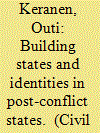

|
|
|
|
|
| Publication |
2014.
|
| Summary/Abstract |
An integral part of state formation processes is identity-building: 'making one out of many' as Walzer puts it. This is also true in terms of contemporary, internationally led statebuilding projects. This dimension of international statebuilding is important, as fundamental questions pertaining to belonging are as important to successful post-conflict process as institutional arrangements; in fact, assumptions about identities and group boundaries guide the technical decisions on institutional and governance structures. The central aim of this paper is to reflect upon identity-construction as a part of post-conflict statebuilding through exploring how historical and more recently invented symbols are deployed to construct a specific sense of belonging. The analysis finds a multiplicity of identity-building projects that advance different visions of community and belonging. The outcome is politicised and contentious visual, everyday landscape that legitimises competing local statebuilding projects (grounded in the distinctions between Bosnian peoples), while undermining peacebuilding and reconciliation. Yet, rather than indicating a primordial antagonisms or incompatible 'liberal' and 'local' norms, the conflicts over symbols (and ultimately, identities) between international and local agents are indicative of wider disagreements over how the Bosnian state ought to be organised and are fuelled by the institutional structures of the country and the weaknesses in the international statebuilding
|
|
|
|
|
|
|
|
|
|
|
|
|
|
|
|
| 7 |
ID:
130707
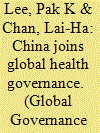

|
|
|
|
|
| Publication |
2014.
|
| Summary/Abstract |
In the wake of China's rapid ascendancy, are there any new rules made by the country in global health governance? This article examines China's emerging role in the Agreement on Trade Related Aspects of Intellectual Property Rights and finds that China adopts a pro-status quo stance on patented medicines. Aspiring to develop its own pharmaceutical sector to be capable to produce patented medicines on a par with the West, it has little appetite for using the prevailing rules or making new rules that are to the liking of the developing world. Undoubtedly, China is a new player in global health governance but has yet to have agenda-setting intent and capacity. This article argues that China's behavior and preferences can be explained by its dualistic national identities, the dominant position of realism in both the study of international relations and policy circles, and an underdevelopment of epistemic community in global health governance in the country.
|
|
|
|
|
|
|
|
|
|
|
|
|
|
|
|
| 8 |
ID:
132939
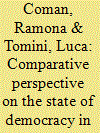

|
|
|
|
|
| Publication |
2014.
|
| Summary/Abstract |
The scholarship on Central and Eastern European politicsand societies is well established in the literature. Over the past two decades, scholars have addressed a variety of topics including the role of civil society in transition and democratic consolidation (Linz & Stepan 1996a, 1996b; P?ibá? & Young 1999; Pridham 2001; Pollack & Wielgohs 2004); the process of institution-building and the functioning of institutions (Karp 1994; Zielonka 2001; Malova & Haughton 2002); the development of political parties and their contribution to democracy (Kitschelt 1992; De Waele 1999; Lewis 2001, 2008; Hough 2005; Deegan-Krause & Haughton 2010; Burnell & Gerrits 2010); the role of external actors in the process of consolidation of democracy, and in particular the role of the EU and the enlargement process (Papadimitriou 2002; Dimitrova 2004; Schimmelfennig & Sedelmeier 2005; Vachudova 2005; Epstein & Sedelmeier 2009; Morlino & Sadurski 2010; O'Brennan 2011); populist parties (Mudde 2007; De Waele & Pacze?niak 2010; Pankowski 2011) and the ambiguous role of nationalism (Latawski 1994; Auer 2004); the problem of the rights of ethnic, linguistic, religious and national minorities (Taras 1998; Rechel 2009); the relationship between justice and politics (Anderson et al.2005; Coman & De Waele 2007; Coman 2009; Piana 2010); the construction of a market economy and the relationship between democracy and economic policies (Jeffries 1996; Stark & Bruszt 1998; Hasselman 2006; Myant & Drahokoupil 2010); political cultures (Pollack 2003; Klingemann 2008); the problems related to corruption (Smilov & Toplak 2007; Schmidt-Pfister & Moroff 2012); and the development of regionalisation and the role of local governments (Hughes et al.2004a, 2004b; Coulson & Campbell 2007).
|
|
|
|
|
|
|
|
|
|
|
|
|
|
|
|
| 9 |
ID:
131791
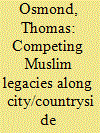

|
|
|
|
|
| Publication |
2014.
|
| Summary/Abstract |
Between the Middle East and Eastern Africa, the city of Harar is often considered as the main historical centre of Islam in Ethiopia and the Horn of Africa. Until recently, the cultural hegemony of the Muslim elites inhabiting Harar was commonly opposed to the almost pagan behaviours of the Oromo - or 'Galla' - farmers and cattle herders living in the wide rural vicinity of the town. The 1995 Constitution provided the different 'ethnolinguistic nationalities' of the new Ethiopian federation with the same institutional recognition. However, the institutionalisation of the two Harari and Oromo 'nationalities' seems to foster the historical duality between the city-dwellers and their close neighbours. This article proposes another political history of Harar and its ambivalent Oromo partners through the local dynamics of the Muslim city/countryside models. It reveals the both competing and complementary orders that have probably bound together the populations of Harar and its rural hinterland for more than five hundred years.
|
|
|
|
|
|
|
|
|
|
|
|
|
|
|
|
| 10 |
ID:
130921
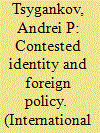

|
|
|
|
|
| Publication |
2014.
|
| Summary/Abstract |
This paper develops a framework for interpreting state international policy by treating national identity as inherently contested. Building on insights from constructivist literature, it proposes a technique for establishing the meaning of foreign policy action on several interrelated levels: state-based, society-based, and international. The paper illustrates the benefits of the approach by selecting the example of Russia's European diplomacy under President Dmitri Medvedev. By studying how officials themselves justify their policies and how these policies are then perceived in broader social and international settings, we have an opportunity to develop a rich understanding of a particular state action, as well as tentatively assess the chances of this action's success or failure.
|
|
|
|
|
|
|
|
|
|
|
|
|
|
|
|
| 11 |
ID:
132711
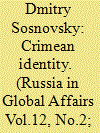

|
|
|
|
|
| Publication |
2014.
|
| Summary/Abstract |
Kiev's attempt to build an all-Ukrainian identity solely on the basis of the Ukrainian ethnos through political centralization, cultural unification, and forceful assimilation was a complete failure. Now, as part of the Russian Federation, which pursues an entirely different regional policy, Crimea has an opportunity to form its own regional identity.
|
|
|
|
|
|
|
|
|
|
|
|
|
|
|
|
| 12 |
ID:
091786
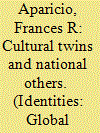

|
|
|
|
|
| Publication |
2009.
|
| Summary/Abstract |
This essay traces various literary and scholarly articulations of what I call intralatino subjectivities. First, I examine the power dynamics, identifications and divergences in the interactions and encounters between two latinos of different national origin, and secondly, the identity negotiations and complexities of the intralatino/a subject, that is, the subject that has two or more different Latino national identities, such as the MexiRican. By tracing these discourses of representation in various scholarly texts, I examine the way in which these intralatino/a sites have been represented both as utopian cultural spaces and as sites of complicated and contradictory cultural borrowings and influences. A detailed reading of two novels, Memory Mambo by Achy Obejas, and Mothertongue by Demetria Martinez, proposes that these two fictional texts are allegorical explorations of intralatino/a relations. A reading of these two novels from the point of view of the colonial analogies between groups serves well in understanding the potential that Latinos have as a pan-identity to create points of solidarity and convergence while still maintaining respect for each other's differences and specificities.
|
|
|
|
|
|
|
|
|
|
|
|
|
|
|
|
| 13 |
ID:
131320
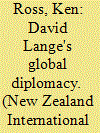

|
|
|
|
|
| Publication |
2014.
|
| Summary/Abstract |
Of New Zealand's fifteen prime ministers since 1945, David Lange has been written about the most in regards to his global diplomacy. He is the one who has written the most insightfully on his own prime ministerial time, particularly about his global diplomacy. Lange gave the Kirk brand--New Zealand as a progressive small state, with a deep internationalism central to our national identity--a new impetus. His standout achievement was in promoting New Zealand's enduring non-nuclear status. He also secured invaluable exposure for New Zealand beyond our traditional audiences in Canberra, London and Washington and repolished New Zealand's good international citizenship credentials
|
|
|
|
|
|
|
|
|
|
|
|
|
|
|
|
| 14 |
ID:
106279
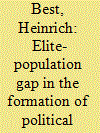

|
|
|
| 15 |
ID:
094987
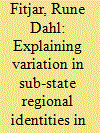

|
|
|
|
|
| Publication |
2010.
|
| Summary/Abstract |
While national identities emerged as the dominant source of territorial identification during the twentieth century, sub-state regional identities are becoming increasingly important in some Western European regions. However, this is not a uniform development. In some regions, nearly half of respondents in Eurobarometer surveys claim a stronger attachment to the region than to the state. In others, less than 4 per cent are primarily attached to their region. This article examines the extent to which these differences are explained by the characteristics of the regions themselves. What, if anything, do regions that mobilise public identity have in common? Developing a model of regional identities, the study examines cultural, geographic, economic and political factors that vary across different regions in Western Europe. The study finds that regional identities tend to be stronger in regions where a regional language is spoken and which do not border the state capital, signalling a cultural and a centre/periphery dimension to regional identity formation. However, there is potentially a more strategic aspect to identification, as regional identities are likely to be stronger in economically developed regions and in regions with highly distinctive voting behaviour.
|
|
|
|
|
|
|
|
|
|
|
|
|
|
|
|
| 16 |
ID:
131987
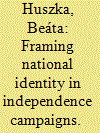

|
|
|
|
|
| Publication |
2014.
|
| Summary/Abstract |
During secessionist mobilization in a multiethnic environment, the use of a discourse that excludes minorities can create internal enemies; meanwhile, co-opting minorities through inclusive framing can turn them into allies. From the standpoint of what sort of identity constitutes the basis of a nationalist movement, my fundamental argument is that the most crucial factor is whether there is a widespread perception of internal threat associated with the presence of a local minority. The chance of such perceptions of a threat emerging among the majority increases if the minority is politically linked to the center or a neighbor that is hostile to the movement. Yet, this explanatory model can show only a tendency depending on the structural setting; it cannot explain the timing and nature of identity shifts. I demonstrate that it is possible to include previously excluded minorities into the national collective through a reframing of national identity, and that the explanation of ethnic exclusion cannot be reduced to a simple ethnic security dilemma.
|
|
|
|
|
|
|
|
|
|
|
|
|
|
|
|
| 17 |
ID:
089780
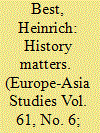

|
|
|
|
|
| Publication |
2009.
|
| Summary/Abstract |
Duscussions of Mass,Group, or Collective Identity tend to be characterised by an abundance fo theoretical and conceptual disputes and a relative lack of empirical foundation; in particular there is a lack of comparative studies based on systematic and reliable data (Bruter 2005, pp. 101-09). The dominent paradigm for both sociological and socio-psychological studies of mass identity is the constructivist approach.This emphasises, to varying degrees, the invented and constructed character of mass identity as opposed to essentialist understandings of the concept which assume a unique core or essence of identity(Scott & Marshall 2009, pp.330-33).
|
|
|
|
|
|
|
|
|
|
|
|
|
|
|
|
| 18 |
ID:
131989
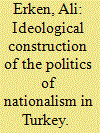

|
|
|
|
|
| Publication |
2014.
|
| Summary/Abstract |
This article analyzes the ideological evolution of Turkish nationalism in politics from 1965 to 1980 providing an in-depth analysis of the ideological contours of the Cumhuriyetçi Köylü Millet Partisi (CKMP; Republican Peasant Nation Party) and its successor the Milliyetçi Hareket Partisi (MHP; Nationalist Movement Party). It shows that there were different channels for indoctrination promoting their own view of nationalism within the movement. It also aims to demonstrate that a tangible shift in the nationalist discourse of the party took place during this period, concomitant to the change of the agents of political nationalism. This transfer of ideological power was reflected in the party's gradually transforming political discourse, swinging from secular nationalism to the margins of religious-conservative nationalism.
|
|
|
|
|
|
|
|
|
|
|
|
|
|
|
|
| 19 |
ID:
132525
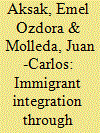

|
|
|
|
|
| Publication |
2014.
|
| Summary/Abstract |
This research focuses on the European Union's (EU) public relations and public diplomacy efforts for immigrant integration. It uncovers the relationship between the EU and leaders of Turkish associations in Brussels, Belgium. In-depth interviews with Turkish association leaders reveal the way they see themselves and the Turkish diaspora, how they reflect on their national identities, and their understanding of EU public diplomacy and public relations strategies. The communication strategies Turkish associations use to gather information about immigrant integration and their opinions on EU communication strategies are also studied. In addition, the research investigates whether two-way communication exists between the Turkish associations and the EU, and unveils the strategic communication and public relations strategies the Turkish diaspora uses to influence public policy and to engage in lobbying.
|
|
|
|
|
|
|
|
|
|
|
|
|
|
|
|
| 20 |
ID:
130550
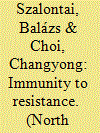

|
|
|
|
|
| Publication |
2014.
|
| Summary/Abstract |
Purpose-This article investigates whether certain social and subnational groups that have shown resistance against other one-party states might play a similar role in North Korea.
Design/methodology/approach-Comparing the DPRK with various Communist regimes and Baathist party-states in Syria and Iraq, this article examines the following social groups as potential factors of resistance: industrial workers, private entrepreneurs, and religious, ethnic and regional identities.
Findings-Resistance has not been wholly absent in North Korean, but the disaffected social groups have lacked sufficient bargaining power, while the state has occasionally refrained from steps that triggered protests in other countries.
Practical implications-By comparing the DPRK with various types of regimes (pre-reform Communist systems, partially market-oriented Communist systems, and Baathist party-states), the article also seeks to investigate whether the dynamics of North Korean society is largely unique, or if it can be at least partially explained by means of analogy.
|
|
|
|
|
|
|
|
|
|
|
|
|
|
|
|
|
|
|
|
|